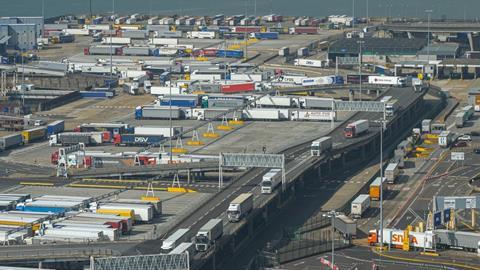Delays caused by the implementation of new border controls between Dover and Calais could end up costing hauliers £1,100 per truck, Logistics UK has warned.
Modelling work by the business group in tandem with MDS Transmodal has raised the prospect of increased food prices as well as empty shelves due to the introduction of the European Entry and Exit System (EES).
Logistics UK said worst case scenarios set out by Ashford Borough Council estimated delays to passengers of up to 14 hours when the new border checks begin and this would have a knock-on effect in terms of disruption and delays to freight:
“We estimate that this would cost £1,100 per truck, a cost which would have to be passed on to the end customer or consumer,” said Kevin Green, Logistics UK policy director.
“And even if delays were limited to 90 minutes for the 3.35 million HGVs that passed through the Short Straits in 2023, the cost to the economy would be £400 million per annum.
“This is a cost that the logistics industry cannot just absorb, not least because our members already operate on incredibly narrow margins and are facing rising operating costs that are putting pressure on their ability to keep trading.”
Green also warned that EU hauliers may choose to bypass the risk of delays at the UK border altogether and opt to work with retailers on the European mainland instead, which would impact upon food supplies and push up prices.
Problems could be compounded with the parallel introduction of regulatory changes on EU imports by the UK next month.
Following the introduction of documentary and risk-based identity and physical checks on goods earlier this year, safety and security declarations will soon be required for imports into GB from the EU.
Logistics UK said these checks, alongside EES biometric passport checks for non-EU travellers, could multiply the risk of delays and congestion.
“Adding border checks on imports to the delays caused by EES could have a disastrous impact on the UK’s supply chain, which was previously about supplying goods as and when they are needed – or ‘just in time’,” Green added.
“We are urging the government to accelerate its diplomatic engagement with French counterparts and the European Commission, and to work closely with the logistics industry and key local partners, to mitigate the impact of EES and streamline border processes before significant damage is caused to the UK’s trading relationships with Europe.”
Last week Logistics UK said that the £10.5m government funding to help Dover port prepare for the EES was not enough to prevent border delays.














